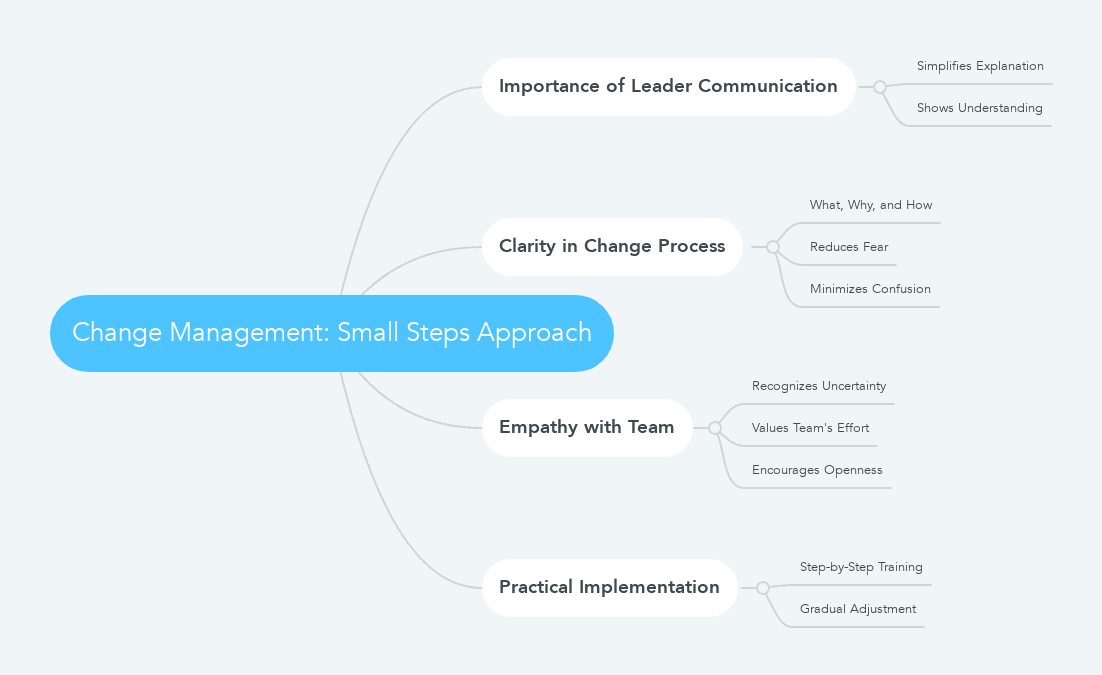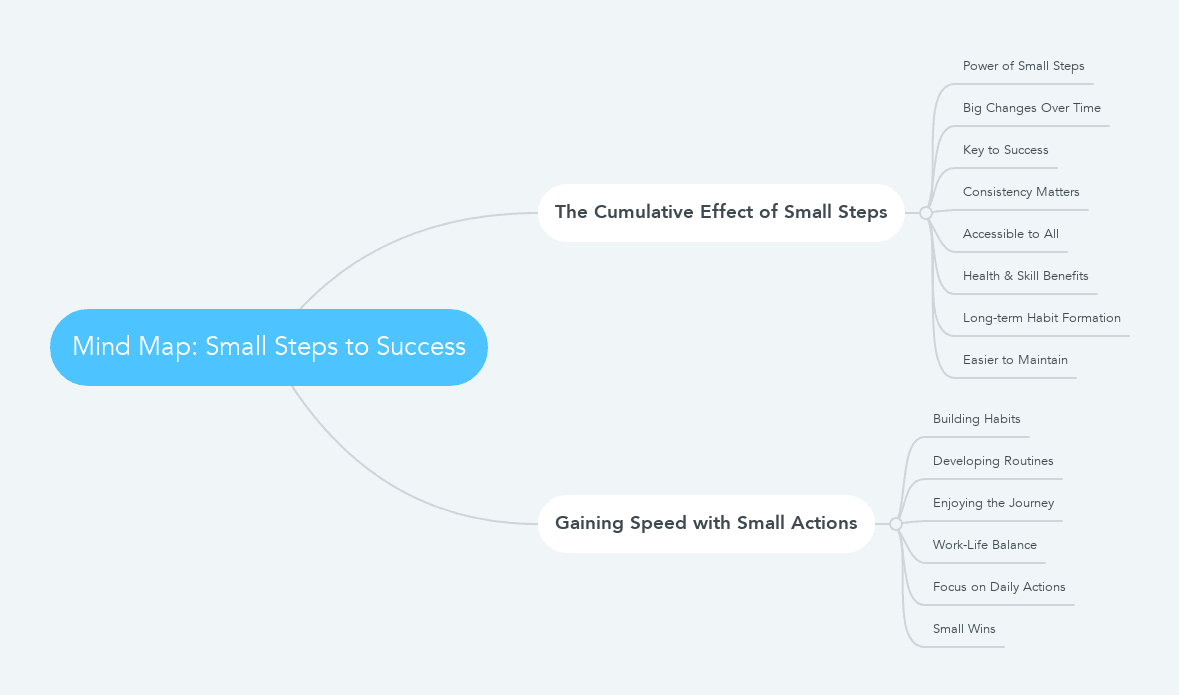- The Neuroscience of Small Steps
- The Fable of the Tortoise and the Hare
- The Role of Small Steps in Change Management
- Small Steps in Personal Productivity
- The Psychological Impact of Small Steps
- The Cumulative Effect of Small Steps
- The Philosophy and Mindset Behind Small Steps
- The Risks of Overlooking Small Steps
The Neuroscience of Small Steps
Building Brain Pathways
Neural Plasticity and Habit Formation
Small steps are key to how our brain changes and adapts, a process called neural plasticity. When we do actions over and over, even small ones, our brain creates new pathways. This makes it easier for us to form and keep new habits. Think of it like this: every small step you take towards a habit helps your brain make that action more automatic.
Strengthening Synapses
Doing things consistently doesn't just build pathways; it makes the connections between brain cells stronger. This is important for learning and remembering things. It's the idea behind "practice makes perfect." The more you practice, the stronger these connections get, making tasks easier to do or remember.
Neurogenesis
Small steps can also help create new brain cells, especially in an area called the hippocampus, which is important for learning and memory. So, by focusing on little bits of progress, you're not just getting better at something; you're also boosting your brain's ability to learn and remember.
Motor Skills Coordination
For skills that need careful movements, like playing an instrument or typing, small steps help improve coordination. This is thanks to the cerebellum, a part of the brain that helps with these fine motor skills. By practicing in small increments, we get better over time.
Maintaining Motivation and Reducing Stress
Adjusting Expectations
Our brains adjust what we expect based on small wins. This can really affect our drive and how we see our progress. By hitting smaller goals step by step, our brains see these as signs of progress, keeping us driven.
Neurotransmitter Balance
Making steady progress keeps important brain chemicals like serotonin and norepinephrine balanced. These chemicals affect our mood and motivation. Small steps ensure these chemicals are released regularly, making us feel good about our progress.
Cortisol Levels
Taking things gradually can lower stress-related cortisol in the brain. Too much cortisol is linked with stress and worry; so by making bit-by-bit progress on tasks or goals, we can keep our stress down. This is good for both our mental health and overall happiness.
Positive Feedback Loops
The brain rewards us for making incremental progress through positive feedback loops. When we achieve something in small steps, our brain makes us feel good about it. This keeps us going because we're getting regular positive signals from our brain that what we're doing is rewarding.
The Fable of the Tortoise and the Hare
In the timeless fable of the tortoise and the hare, we find a simple yet profound lesson on the value of consistency and perseverance. The story begins with a tortoise, known for its slow pace, challenging a hare, celebrated for its speed, to a race. At first glance, the outcome seems predictable. The hare, confident in its ability to win, dashes ahead, leaving the tortoise far behind. However, this confidence turns into complacency as the hare decides to take a nap mid-race, thinking it has plenty of time to spare.
Meanwhile, the tortoise continues at a slow but steady pace. It doesn't stop or get distracted; it simply keeps moving forward. This methodical approach might not seem impressive at first, especially compared to the bursts of speed from the hare. Yet it's this very consistency that eventually leads the tortoise to overtake the napping hare and cross the finish line first.
The moral "Slow and steady wins the race" is not just about racing but is a valuable principle for achieving goals in life. The tortoise's victory serves as a powerful metaphor for how small, consistent steps can lead to success. In contrast, the hare's mistake highlights how quick successes or a desire for immediate results can lead to complacency and ultimately failure.
This fable beautifully illustrates that endurance and persistence often triumph over fleeting bursts of effort or speed. It reminds us that progress towards any goal isn't always about being the fastest or strongest but about moving forward consistently, no matter how slow it might seem.
By embracing the lesson of the tortoise and applying it to our lives, we can see how taking smaller steps towards our goals can be incredibly effective. It's not about making dramatic leaps forward but rather about maintaining a steady pace that ensures we keep moving in the right direction. This approach might not be as glamorous or exciting as sprinting ahead full speed, but as shown in this classic tale, it's often what gets us across the finish line first.
The Role of Small Steps in Change Management

In managing change, how leaders talk and show they understand matters a lot. Making the change into smaller, easier steps can really help. This way, explaining why the change is needed becomes simpler for employees to get. It also shows that leaders get what their team is going through.
Being clear when talking about change is key. It makes sure everyone knows not just what is changing and why, but also how it will happen. By breaking big changes into smaller tasks, leaders can give clear instructions and make the whole thing less scary for employees. This approach cuts down on confusion and strengthens the reason behind the need for change.
Understanding how your team feels is also important. During changes, employees often feel unsure or worried about what's coming. Leaders who show they get it can better help their teams through these times. They show they value their team's hard work and challenges, making them feel seen and heard. This kind of support is important because it helps people be more open to change.
For example, if a company is starting to use new software, introducing it step by step instead of all at once makes training easier and lets employees adjust bit by bit.
Small Steps in Personal Productivity
Cultivating Consistency
Getting better at personal productivity often starts with small, regular steps, not big jumps. It's easy to think that being a genius or highly successful is all about natural talent. But actually, making a consistent effort is really important. Doing a little bit regularly can lead to big results over time. This shows us that anyone can develop their genius.
Adding small steps into your daily routine is a smart way to get more done. Using methods like time-blocking, where you set aside specific times for certain tasks, and task batching, where you do similar tasks together, can help a lot. These strategies help organize your day and make sure you're moving forward on your goals.
To keep up with these small efforts, you might need some tools or habits. Setting reminders or using a habit tracker can help keep you on the right path. The main thing is to make these small efforts a normal part of your day so they help you reach your bigger goals.
Celebrating Small Wins
It's really important to notice and celebrate every small success along the way. These little achievements might not seem like much by themselves, but together they're key for reaching bigger goals. They show that you're making progress, which keeps you motivated and confident in your ability to succeed.
There are many ways to celebrate these tiny victories. Writing them down in a success journal or sharing them with friends or colleagues can be good ways to acknowledge them.
It's crucial not to ignore the importance of these small wins. Not appreciating them can hurt your motivation and self-esteem, slowing down your progress instead of speeding it up. By focusing on the journey and recognizing every step forward, no matter how small, you create a positive loop of achievement.
The Psychological Impact of Small Steps
Reducing Stress and Overwhelm
When we split a big task into smaller, easier pieces, it stops feeling so scary. This way, we avoid getting stuck overthinking everything (a problem called analysis paralysis). Looking at a project as a bunch of small steps makes it seem doable because each step is a simple part that moves us closer to finishing. It's like seeing hurdles as things you can step over rather than walls blocking your way.
This method also tricks our brain into feeling less scared of failing. By focusing on tiny goals, we don't trigger the brain's fear centers as much. So, the task seems less daunting, and we're more likely to start.
Enhancing Focus and Motivation
Breaking tasks down also helps us concentrate better by keeping us from feeling mentally overloaded. When looking at a big goal, it's easy to get anxious and lose focus. But if we know we only have to do one small thing at a time, it clears up our minds, letting us focus on the task at hand.
This approach also makes us feel good about making progress. Starting with small goals makes it easier to get going because achieving these goals feels great and pushes us to keep going.
Plus, working on these small tasks gets our prefrontal cortex—the part of the brain that helps us plan and control what we do—more involved. This means we get better at organizing our tasks and fitting them into our schedules.
The Cumulative Effect of Small Steps

The Power of Small Steps
Small steps can make big changes over time. This simple idea is a key to long-term success and growth. When we do small things regularly, they add up and push us forward towards our goals. The great thing about small steps is that anyone can do them. What really counts is doing these small things often, rather than doing a lot all at once.
For example, making tiny health choices, like taking the stairs or eating more veggies, can greatly improve your health over time. Or setting aside a little time every day to write or learn something new can lead to big improvements in skills or knowledge.
Sticking with these small habits for a long time is what makes them stick and become part of our daily life. This way of making changes is easier to keep up than trying to change everything at once.
Gaining Speed with Small Actions
By focusing on small, regular actions, we build habits that help us achieve our goals in the long run. This approach helps us develop routines that make it easier to keep going. It's about enjoying each step along the way and seeing how they all add up to help us reach our bigger goals.
In work-life balance, for example, making progress bit by bit leads to happiness and balance. It shows how taking things one step at a time is valuable whether we're talking about work, getting fit, or growing personally.
This method also teaches us to focus more on what we're doing every day rather than just the final goal. By valuing each small action and its role in our progress, we start seeing growth as a series of small wins rather than just waiting for one big moment.
The Philosophy and Mindset Behind Small Steps
Embracing Simplicity and Mindfulness
Taking small steps is all about keeping things simple. This idea comes from minimalism and Zen Buddhism, which both tell us to cut down on clutter and complexity in our lives. By focusing on small, easy actions, we're choosing a way of life that values simplicity. This isn't just about doing less; it's about making each action count more.
Here, the concept of "emptiness" is important. But emptiness doesn't mean nothingness. It's about the value of space and what's not there in our lives. This space lets us think, adjust, and grow. Small steps help create this kind of space, letting us achieve big things over time without rushing or trying to do too much at once.
Simplifying how we approach our goals helps us connect more deeply with reaching them. It allows us to focus on what really matters without getting lost in the final outcome. It's about enjoying the journey as well as where we're going.
Pursuing Purpose and Sustainable Growth
Moving from simplicity, finding purpose comes from Aristotle's idea of eudaimonia—doing well by living a life with purpose. Small steps are crucial here because they let us act consistently with purpose. Each step reflects our dedication to our goals and what we value.
Stoic principles add to this mindset by highlighting calmness and accepting change. Life is full of ups and downs. By taking small steps, we keep a calm and flexible mindset, ready to handle whatever comes our way smoothly.
Looking at it from an eco-friendly angle, being sustainable is key. Our planet is facing big challenges because of too much consumption and waste. By choosing a small-steps approach, we're part of the solution. Making gradual progress in how we live can lead to less environmental impact and smarter choices about what we use.
The Risks of Overlooking Small Steps
When we aim for big goals, it's easy to skip over the small steps. But these small steps are important. They're the foundation of success. Not paying attention to them can lead to problems that slow us down.
First off, each small step helps us learn and get better at what we do. If we skip these steps, we miss out on improving our skills. Also, sometimes ignoring the details can get us into trouble with rules or laws, which is something we definitely want to avoid.
Finding the right balance between moving fast and steady is key. We need to keep a steady pace to make sure our progress lasts. Trying to rush things can throw off this balance and lead to burnout or not-so-great results. Being patient lets us value each step and keeps us moving forward in a good way.
Having a growth mindset means focusing on getting better step by step, not just wanting instant results. If we overlook the small steps, it's hard to keep this mindset. Remembering that every little effort counts helps us stay positive and committed over time.
Sticking with it and keeping our eyes on our long-term goals are crucial for reaching big achievements. Ignoring the small steps can make us less persistent and lose focus on our goals, which often leads to feeling discouraged when things get tough.
Keeping track of our progress and having someone hold us accountable are important for seeing how far we've come. Without this, it's easy to lose track of our achievements, which can make us less motivated.
Lastly, not seeing the value in small steps can affect how positive we feel. Recognizing every effort helps us stay upbeat and deal with setbacks better. It reminds us that every bit of effort matters and that setbacks are just part of the journey toward success.









